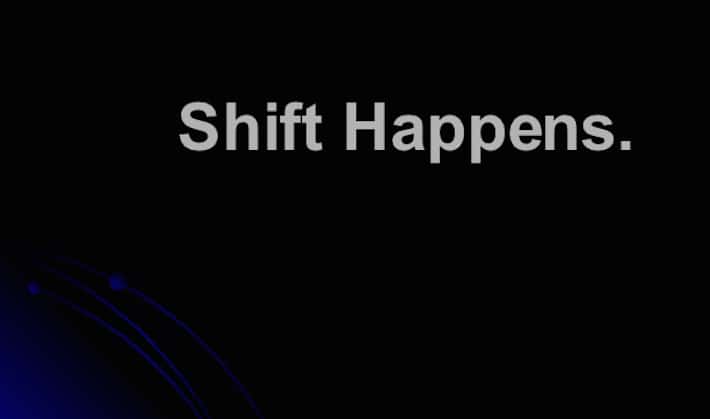Shift Happens: Preparing Our Kids for the Challenges of the Twenty-first Century
In October of 2008 I first encountered the now viral YouTube-posted video Did You Know?/Shift Happens, developed by an American High School teacher for a staff meeting at his school in 2007. It is now in its sixth version, but the first two versions alone were watched more than 10 million times.
If you want to know what all the fuss is about, take a look at the latest iteration:
Education has never been as complex; as the video states, “We are currently preparing students for jobs that don’t yet exist…using technologies that haven’t been invented…in order to solve problems we don’t even know are problems yet.” In short, the learning we deliver has to prepare them for a world in which the only constant is change. Thus, twenty-first century learning has to be future-proofed; it must provide students with all the skills and aptitudes necessary to succeed in a changing and globalised world.
So how do we do this? As a parent, what should you expect from your child’s school? If you are a teacher, what elements should the lessons you design encompass? Is it enough just to carry on with the traditional approaches of the past or does there need to be a shift in learning too? President of the US-based National Association of Independent Schools (NAIS) Pat Bassett has postulated that twenty-first century learning has to be based on the 6Cs:
- Communication
- Critical thinking
- Creativity
- Collaboration
- Cosmopolitanism – cross-cultural competencies
- Character
Bassett is not suggesting that these replace traditional subjects, simply that they also need to be consciously and deliberately woven into the learning that teachers design and deliver for students today.
Communication abilities need to be multilingual, in written and spoken forms, involving a high level of both visual literacy and interpersonal intelligence: the ability to move between quite different media will become crucial. As everyone increasingly requires the ability to interpret, analyse, synthesise and create information, critical thinking will become a key determinant of success in both academics and life.
Even if we are starting to get bored with people banging on about ‘creativity’, there is no doubt that in a future of constant change it is those who can think outside of the box who will have a competitive advantage. Humankind’s creative instinct shows itself in all areas of human endeavour, so it is not just something for the teachers of the arts to be thinking about; Thomas Edison was pretty creative after all!
When I started working it was still the norm for most work to be essentially individual: one of the big changes in the workplace has been the shift to team working: being a contributing team member is a learnt skill, and schools need to teach this. Increasingly, the chances are that members of the team will come from different cultural backgrounds, especially if it is a global e-team, and the ability to understand the impact of culture on people is also going to be increasingly valued: cosmopolitanism looks to value what we all have in common whilst understanding our differences.
Finally, old-fashioned as it might initially seem, schools still need to undertake character education: in fact, given the pitfalls and temptations of the digital world, it is probably more important than ever. Integrity – doing the right thing – is what will guide young people through their virtual and real lives, but we need to be explicit about what is expected, and we need to model it as adults and educators.
In conclusion, by now it should be obvious that twenty-first century learning is not about getting iPads and the latest technologies into our learning spaces: however, it is about developing in our students the talents, skills and dispositions to equip them for the unpredictability of their future. To ignore this is to do our students a huge disservice.
Mark Exton has worked in international education for more than 20 years, in the UK, Egypt, Vietnam, Sudan and Peru, and is currently principal of Hiroshima International School.


